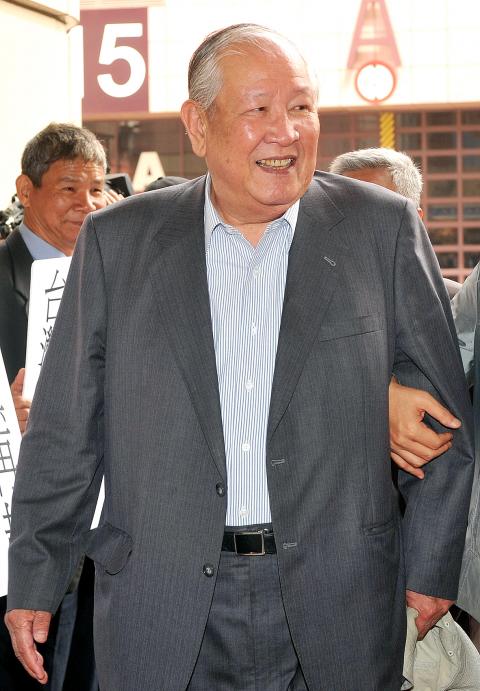Taiwan independence pioneer and World United Formosans for Independence (WUFI) chairman Ng Chiau-tong (黃昭堂) died yesterday from complications arising from sinus surgery. He was 79.
Ng was rushed to the National Taiwan University (NTU) Hospital in Taipei after suffering heart failure halfway through surgery at the Koo Foundation Sun Yat-Sen Cancer Center in Taipei earlier in the day.
Ng died of heart failure at around 11am, WUFI secretary--general Wang Kan-hou (王康厚) said.

Photo: Chien Jung-fong, Taipei Times
Taiwan Nation Alliance convener Yao Chia-wen (姚嘉文) said Ng’s death was totally unexpected.
“The Democratic Progressive Party [DPP] was grief-stricken to learn about Ng’s passing. He has devoted his whole life to Taiwan’s democracy and freedom and his spirit will live with us forever and call on us to fight for the well-being of the next generation. May he rest in peace,” DPP Chairperson Tsai Ing-wen (蔡英文) told reporters at a campaign stop before she visited Ng’s family at the hospital.
Ng’s passing is a “great loss for the Taiwan independence movement,” said Lee Yeng-chyh (李永熾), a history professor.
“Ng has never wavered in his support for Taiwan’s independence. We should remember him for his determination, perseverance and his love for Taiwan,” DPP Legislator Tsai Huang-liang (蔡煌瑯) said.
Tainan-born Ng was known for his decades of dedication to the independence movement. He was also one of the main organizers of the 228 Hand-in-Hand rally, widely seen as a crucial event contributing to former president Chen Shui-bian’s (陳水扁) re-election, when more than 1 million Taiwanese formed a human chain across the west coast on Feb. 28, 2004.
Born in 1932 during the Japanese colonial era, Ng went to Japan for further study after graduating from NTU in 1958. He began participating in the independence movement the following year when he was working on his master’s degree at then-Tokyo Imperial University.
He founded the Taiwan Youth Society, the forerunner of today’s WUFI Japan office, in 1960 in Tokyo. That act led to him being placed on a Chinese Nationalist Party (KMT) government blacklist, thereby barring him from returning to Taiwan.
Ng, who did not return to Taiwan until 1992, had served as WUFI chairman since 1995 and as a presidential adviser during Chen’s DPP administration.
A self-proclaimed supporter of “swift independence” when he was younger, Ng told the Taipei Times in an interview in August that his eventual goal would be “removing the ROC [Republic of China] political system, which was forced upon Taiwanese by the regime of Chiang Kai-shek (蔣介石) after the end of World War II.”
However, he later adopted a more moderate approach, saying that the removal of the ROC system would take time and could not occur without a healthy combination of domestic political development, global trends and, most of all, the consensus and will of the public.
“The ROC is like a cap on the top of our head. If it’s rainy, we’ll have to wear it for now, but we are waiting for a sunny day to take it off,” he said in the interview. “I am very optimistic. The Taiwan independence movement will succeed someday.”

TRAGEDY STRIKES TAIPEI: The suspect died after falling off a building after he threw smoke grenades into Taipei Main Station and went on a killing spree in Zhongshan A 27-year-old suspect allegedly threw smoke grenades in Taipei Main Station and then proceeded to Zhongshan MRT Station in a random killing spree that resulted in the death of the suspect and two other civilians, and seven injured, including one in critical condition, as of press time last night. The suspect, identified as a man surnamed Chang Wen (張文), allegedly began the attack at Taipei Main Station, the Taipei Fire Department said, adding that it received a report at 5:24pm that smoke grenades had been thrown in the station. One man in his 50s was rushed to hospital after a cardiac arrest

A car bomb killed a senior Russian general in southern Moscow yesterday morning, the latest high-profile army figure to be blown up in a blast that came just hours after Russian and Ukrainian delegates held separate talks in Miami on a plan to end the war. Kyiv has not commented on the incident, but Russian investigators said they were probing whether the blast was “linked” to “Ukrainian special forces.” The attack was similar to other assassinations of generals and pro-war figures that have either been claimed, or are widely believed to have been orchestrated, by Ukraine. Russian Lieutenant General Fanil Sarvarov, 56, head

SAFETY FIRST: Double the number of police were deployed at the Taipei Marathon, while other cities released plans to bolster public event safety Authorities across Taiwan have stepped up security measures ahead of Christmas and New Year events, following a knife and smoke bomb attack in Taipei on Friday that left four people dead and 11 injured. In a bid to prevent potential copycat incidents, police deployments have been expanded for large gatherings, transport hubs, and other crowded public spaces, according to official statements from police and city authorities. Taipei Mayor Chiang Wan-an (蔣萬安) said the city has “comprehensively raised security readiness” in crowded areas, increased police deployments with armed officers, and intensified patrols during weekends and nighttime hours. For large-scale events, security checkpoints and explosives

PUBLIC SAFETY: The premier said that security would be tightened in transport hubs, while President Lai commended the public for their bravery The government is to deploy more police, including rapid response units, in crowded public areas to ensure a swift response to any threats, President William Lai (賴清德) said yesterday after a knife attack killed three people and injured 11 in Taipei the previous day. Lai made the remarks following a briefing by the National Police Agency on the progress of the investigation, saying that the attack underscored the importance of cooperation in public security between the central and local governments. The attack unfolded in the early evening on Friday around Taipei Main Station’s M7 exit and later near the Taipei MRT’s Zhongshan